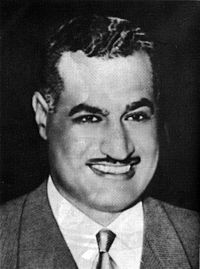Gamal Abdel Nasser Politician
Gamal Abdel Nasser Hussein (Arabic: جمال عبد الناصر حسين, IPA: [ɡæˈmæːl ʕæbdenˈnɑːsˤeɾ ħeˈseːn]; 15 January 1918 – 28 September 1970) was the second President of Egypt, serving from 1956 until his death. He planned the 1952 overthrow of the monarchy, and was deputy prime minister in the new government. In 1953, Nasser introduced far-reaching land reforms. Following a 1954 Muslim Brotherhood-led attempt on his life, he ordered a crackdown on the organization, put President Muhammad Naguib under house arrest, and assumed executive office. A June 1956 public referendum approved both the new constitution and Nasser's nomination for presidency.Nasser's neutralist policies during the Cold War led to tense relations with Western powers, which withdrew funding for the planned Aswan Dam. Nasser's retaliatory move to nationalize the Suez Canal Company in 1956 was acclaimed within Egypt and the Arab world. Consequently the United Kingdom and France occupied the Suez Canal zone, while Israel invaded the Sinai Peninsula. The three allies withdrew amid international pressure, boosting Nasser's political standing significantly. From then on, Nasser's popularity in the region grew substantially and calls for pan-Arab unity under his leadership increased, culminating with the formation of the United Arab Republic with Syria (1958–1961).In 1962, Nasser began a series of major socialist measures and modernization reforms in Egypt. Despite setbacks to his pan-Arabist cause, by 1963 Nasser's supporters gained power in several Arab countries. He also became embroiled in the North Yemen Civil War. Nasser introduced a new constitution in 1964, the same year he became president of the international Non-Aligned Movement, which he co-founded. He began his second presidential term in March 1965 after his political opponents were legally forbidden from running. Following Egypt's concessions to Israel in the 1967 Six-Day War, Nasser resigned only to retake office after popular demonstrations called for his reinstatement. Between the 1967 defeat and 1968, Nasser appointed himself prime minister, launched a war to regain lost territory, began a process of depoliticizing the military, and issued a set of political liberalization reforms.After the conclusion of the 1970 Arab League summit, Nasser suffered a heart attack and died. His funeral in Cairo drew five million mourners and an outpouring of grief across the Arab world. Nasser remains an iconic but controversial figure and symbol of Arab dignity in the present day, particularly for his strides towards social justice and Arab unity, modernization policies, and anti-imperialist efforts. His presidency also encouraged and coincided with an Egyptian cultural boom, particularly in the arts. Nasser's detractors criticize his authoritarianism, his government's human rights violations, his populist relationship with the citizenry, and his failure to establish civil institutions, blaming his legacy for future dictatorial governance in Egypt. Historians describe Nasser as one of the towering political figures of the Middle East in the 20th century.
Personal facts

| Alias (AKA) | جمال عبد الناصر (Arabic); Naser Jamal Abd al- (alternate transliteration); Nasser Jamal Abd An- (alternate transliteration) |
|---|---|
| Birth date | January 15, 1918 |
| Birth name | Gamal Abdel Nasser Hussein |
| Birth place | |
| Nationality | |
| Religion | |
| Date of death | September 28, 1970 |
| Place of death | |
| Spouse | |
| Children |
Search
Office holder
| military operations | |
|---|---|
| military branch | |
| military rank | |
| office | Deputy Prime Minister of Egypt Prime Minister of Egypt Minister of the Interior Chairman of the Revolutionary Command Council Secretary General of the Non-Aligned Movement President of the United Arab Republicformerly President of the Republic of Egypt |
| party | |
| president | |
| prime minister | |
| service end | 1952 |
| service start | 1938 |
| successor |